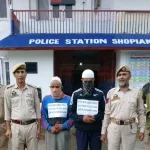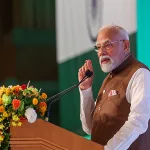New Delhi, Dec 02: Union Minister of State (Independent Charge) for Science & Technology; MoS PMO, Personnel, Public Grievances, Pensions, Atomic Energy, and Space, Dr Jitendra Singh on Saturday said time has come to define “Bio-vision” for Bharat.
Addressing the inaugural meeting of the BRIC Society, which was registered on November 10, 2023, following Cabinet approval, Dr Singh said the newly established Apex Autonomous Society, Biotechnology Research and Innovation Council (BRIC), will fulfill Prime Minister Narendra Modi’s vision for Atma Nirbhar Bharat in areas like healthcare, food, and energy needs by scaling biotech research and innovation. He highlighted that in the last eight years, the biotech sector has grown eightfold.
Quoting PM Modi, Dr Jitendra Singh said, “India is not too far from reaching the league of the top-10 countries in Biotech’s global ecosystem.” He added that BRIC is going to be a testament to this, bringing together the best minds on a unified platform under the spirit of Sabka Prayas. Dr. Jitendra Singh informed that the Department of Biotechnology (DBT), Ministry of Science and Technology, is functioning as the nodal agency for the promotion of Biotechnology in the country. Cabinet approval was granted for the rationalization of its 14 Autonomous Institutions (AIs), subsuming them under one Apex Autonomous Society, BRIC, for centralized and unified governance to maximize the impact of biotech research across the country.
Describing the BRIC meeting as a historic event in India’s Biotech Ecosystem, where elite institutions are consolidating efforts to impact the biotech R&D ecosystem, the union minister expressed hope that BRIC will prospectively enrich India’s progress on every front, including the economy and employment. As accomplished institution-builders, he sought their views for defining the Bio-Vision for Bharat in this significant meeting, recognizing their potential to bring tremendous value to this noble mission.
He highlighted that this is one of the first Departments in the Government of India to successfully execute the “Rationalization of Autonomous Bodies” for the process and performance enhancement of its Autonomous bodies. Significant changes driven by BRIC include each of the 14 subsumed BRIC Institutions maintaining distinct research mandates, governed by one Governing Body at BRIC. Institutes will be allowed utilization of institutional lab space, not exceeding one-third, for researchers from outside DBT institutes and their collaborators (from industry or other institutes) to carry out R&D for startups emerging out of institutional research, he said.
Additionally, BRIC and its institutes can engage in public-private research partnerships and receive endowments, including funds from non-governmental resources for research-related activities. New PhD programs across BRIC institutions with a common course curriculum at RCB and immersion training for field or experimental studies for validating research hypotheses prior to thesis work were also mentioned. During the Immersion phase (for about 3 months), students will receive additional fellowships from the Grand Challenges India program. To enhance the scientific character of the institutions, 120 scientific positions are being added. Parity across levels and cadres is also being pursued, along with improvements in service prospects for scientists.





